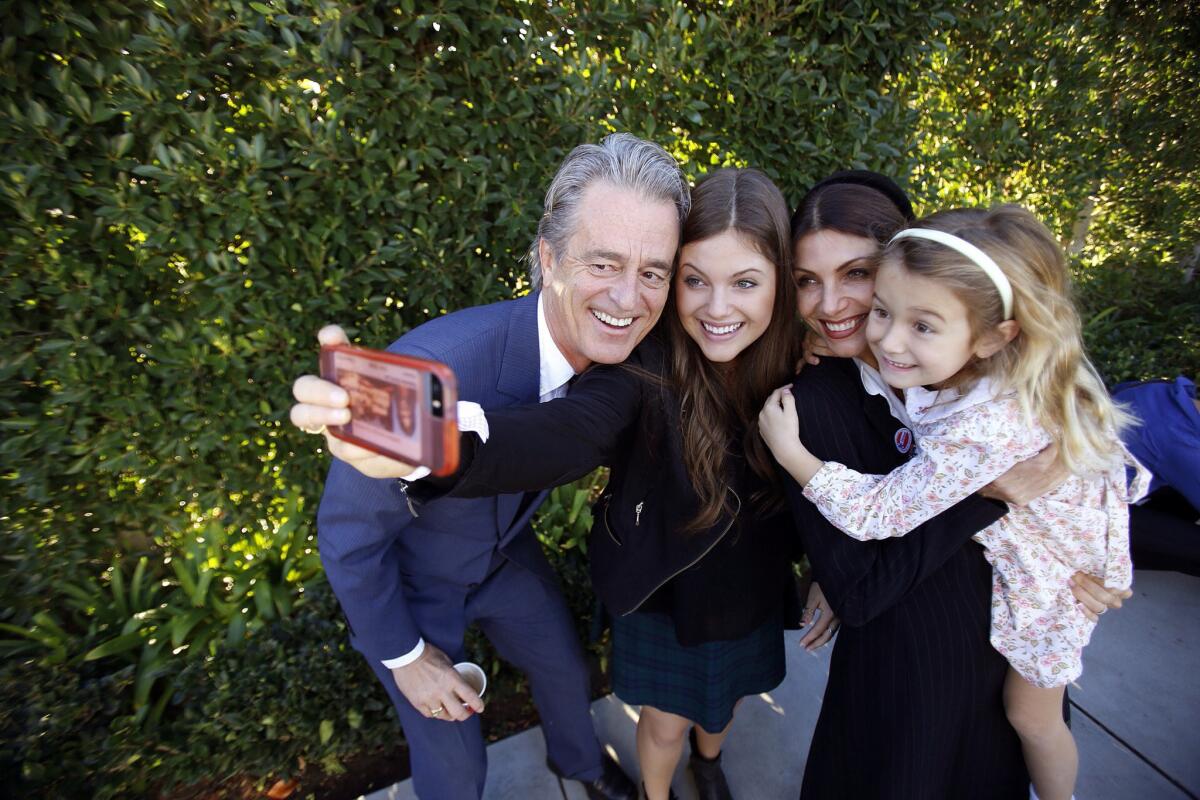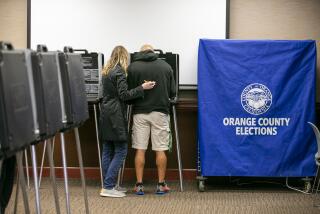Ballot selfies are illegal, but this Bay Area legislator says they shouldn’t be

Bobby Shriver and his family pose for a selfie after he and his wife cast thier ballots in the November 2014 election in Santa Monica.
Beyonce’s done it, Sean Hannity’s done it, and we all know Kim Kardashian has done it too. Now a Bay Area lawmaker wants all California voters to be able to do it too, without the threat of arrest.
That is, take selfies in the voting booth.
A new bill sponsored by Assemblyman Marc Levine (D-San Rafael) would legalize so-called “ballot selfies” and allow citizens to share photos of themselves voting on social media.
“People are taking pictures of their dogs, they’re taking pictures of their dinner, so let’s take pictures of voting,” Levine said in an interview. “It’s time to make voting cool and ubiquitous, and ballot selfies are a powerful way to do that.”
The Marin County lawmaker says he took his first “ballot selfie” in 2009, right after casting a vote for himself in the San Rafael City Council race. He saw many of his own friends posting similar photos on Facebook from their polling places.
“I realized that this is something more people should be doing,” Levine said, adding that if more people posted photos of their ballots on social media, it could help turn around the state’s dismal voter turnout.
But California law prohibits any voter from showing his or her ballot to another person after marking it. And anyone who takes photos or videos within 100 feet of a polling place with the intent of dissuading a voter could land in jail.
No Californian has ever faced prosecution for taking a “ballot selfie,” Levine said.
Federal judges in two separate court cases have struck down similar ballot photo bans in Indiana and New Hampshire, saying they violated the 1st Amendment. The ACLU, which sued in both cases, has said sharing such ballot photos is “an expression of pride and enthusiasm about voting, and is a form of political speech that must be protected.”
Levine’s proposal is the latest in a string of recent efforts to bolster California’s flagging voter participation, which reached a statewide historic low in 2014.
State and local leaders have proposed automatically registering all eligible voters, creating larger “voting centers” instead of assigning polling places, and a “motor voter” bill to automatically register all eligible voters when they get a driver’s license recently became law.
In Los Angeles, where voter turnout hit a rock-bottom of 10% in the March city elections, one voter even won $25,000 as part of a nonprofit-sponsored lottery encouraging people to vote.
Election law experts say while Levine’s bill presents a novel idea for tackling low turnout, it may not have much of an effect, as the reasons people vote are much deeper and more complex.
The ban on ballot photos is meant to prevent vote-buying and voter coercion, where a photo might serve as proof of how they voted. Jessica Levinson, president of the Los Angeles City Ethics Commission and a clinical law professor at Loyola Law School, says while she agrees the law is problematic in the digital age, changing it might have the unintended consequence of making it easier for organizations or employers to pressure voters.
“An employer could say, ‘Oh, we’re all voting for this today, really looking forward to seeing your ballot on Facebook later,’” Levinson said.
Kim Alexander of the California Voter Foundation agreed altering the law could theoretically make vote buying more likely.
“But of all the ballot security issues that I worry about, it’s pretty low on my list,” she said.
And removing a barrier to getting everyday people excited about voting might not be a bad thing, she adds.
“Voting is not something people do very often, and if they’re enthusiastic about it and they take a picture of their ballot, it becomes a negative experience if they’re told they can’t. You don’t want to quash people’s enthusiasm.”
California’s top elections official seems to agree.
“’Ballot selfies’ posted through social media have become a form of political expression used by many citizens to show their pride for civic participation,” California Secretary of State Alex Padilla said in a statement. “We should not discourage citizens from engaging in political speech, but at the same time, we must protect the integrity of our elections and a voter’s right to privacy.”
Still, Levinson says, boosting voter turnout in California is going to be a heavier lift than loosening selfie rules.
“If it takes you seeing a friend posting a selfie from the voting booth to get you to the ballot box,” she said, “then we still have other problems.”
For more on California politics, follow me @cmaiduc
Sign up for our daily Essential Politics newsletter
More to Read
Get the L.A. Times Politics newsletter
Deeply reported insights into legislation, politics and policy from Sacramento, Washington and beyond. In your inbox three times per week.
You may occasionally receive promotional content from the Los Angeles Times.







